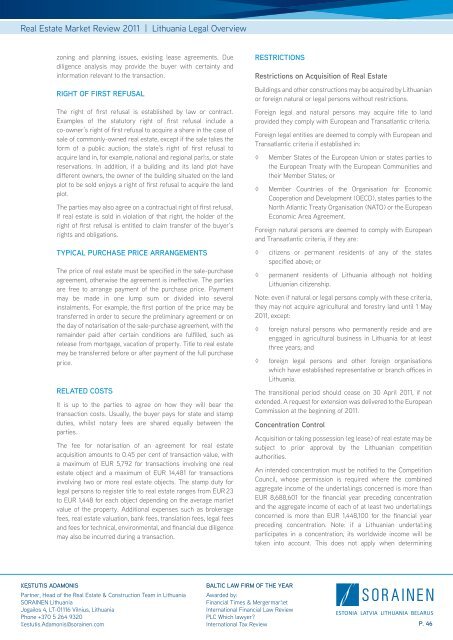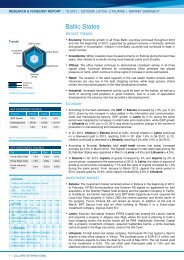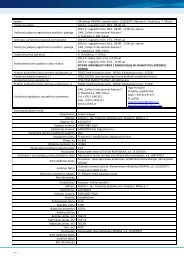baltic states and belarus real estate market review - Colliers
baltic states and belarus real estate market review - Colliers
baltic states and belarus real estate market review - Colliers
You also want an ePaper? Increase the reach of your titles
YUMPU automatically turns print PDFs into web optimized ePapers that Google loves.
Real Estate Market Review 2011 | Lithuania Legal Overview<br />
zoning <strong>and</strong> planning issues, existing lease agreements. Due<br />
diligence analysis may provide the buyer with certainty <strong>and</strong><br />
information relevant to the transaction.<br />
Right of First Refusal<br />
The right of first refusal is established by law or contract.<br />
Examples of the statutory right of first refusal include a<br />
co‐owner’s right of first refusal to acquire a share in the case of<br />
sale of commonly-owned <strong>real</strong> <strong>estate</strong>, except if the sale takes the<br />
form of a public auction; the state’s right of first refusal to<br />
acquire l<strong>and</strong> in, for example, national <strong>and</strong> regional parks, or state<br />
reservations. In addition, if a building <strong>and</strong> its l<strong>and</strong> plot have<br />
different owners, the owner of the building situated on the l<strong>and</strong><br />
plot to be sold enjoys a right of first refusal to acquire the l<strong>and</strong><br />
plot.<br />
The parties may also agree on a contractual right of first refusal.<br />
If <strong>real</strong> <strong>estate</strong> is sold in violation of that right, the holder of the<br />
right of first refusal is entitled to claim transfer of the buyer’s<br />
rights <strong>and</strong> obligations.<br />
Typical Purchase Price Arrangements<br />
The price of <strong>real</strong> <strong>estate</strong> must be specified in the sale-purchase<br />
agreement, otherwise the agreement is ineffective. The parties<br />
are free to arrange payment of the purchase price. Payment<br />
may be made in one lump sum or divided into several<br />
instalments. For example, the first portion of the price may be<br />
transferred in order to secure the preliminary agreement or on<br />
the day of notarisation of the sale-purchase agreement, with the<br />
remainder paid after certain conditions are fulfilled, such as<br />
release from mortgage, vacation of property. Title to <strong>real</strong> <strong>estate</strong><br />
may be transferred before or after payment of the full purchase<br />
price.<br />
Related Costs<br />
It is up to the parties to agree on how they will bear the<br />
transaction costs. Usually, the buyer pays for state <strong>and</strong> stamp<br />
duties, whilst notary fees are shared equally between the<br />
parties.<br />
The fee for notarisation of an agreement for <strong>real</strong> <strong>estate</strong><br />
acquisition amounts to 0.45 per cent of transaction value, with<br />
a maximum of EUR 5,792 for transactions involving one <strong>real</strong><br />
<strong>estate</strong> object <strong>and</strong> a maximum of EUR 14,481 for transactions<br />
involving two or more <strong>real</strong> <strong>estate</strong> objects. The stamp duty for<br />
legal persons to register title to <strong>real</strong> <strong>estate</strong> ranges from EUR 23<br />
to EUR 1,448 for each object depending on the average <strong>market</strong><br />
value of the property. Additional expenses such as brokerage<br />
fees, <strong>real</strong> <strong>estate</strong> valuation, bank fees, translation fees, legal fees<br />
<strong>and</strong> fees for technical, environmental, <strong>and</strong> financial due diligence<br />
may also be incurred during a transaction.<br />
Restrictions<br />
Restrictions on Acquisition of Real Estate<br />
Buildings <strong>and</strong> other constructions may be acquired by Lithuanian<br />
or foreign natural or legal persons without restrictions.<br />
Foreign legal <strong>and</strong> natural persons may acquire title to l<strong>and</strong><br />
provided they comply with European <strong>and</strong> Transatlantic criteria.<br />
Foreign legal entities are deemed to comply with European <strong>and</strong><br />
Transatlantic criteria if established in:<br />
◊<br />
◊<br />
Member States of the European Union or <strong>states</strong> parties to<br />
the European Treaty with the European Communities <strong>and</strong><br />
their Member States; or<br />
Member Countries of the Organisation for Economic<br />
Cooperation <strong>and</strong> Development (OECD), <strong>states</strong> parties to the<br />
North Atlantic Treaty Organisation (NATO) or the European<br />
Economic Area Agreement.<br />
Foreign natural persons are deemed to comply with European<br />
<strong>and</strong> Transatlantic criteria, if they are:<br />
◊<br />
◊<br />
citizens or permanent residents of any of the <strong>states</strong><br />
specified above; or<br />
permanent residents of Lithuania although not holding<br />
Lithuanian citizenship.<br />
Note: even if natural or legal persons comply with these criteria,<br />
they may not acquire agricultural <strong>and</strong> forestry l<strong>and</strong> until 1 May<br />
2011, except:<br />
◊<br />
◊<br />
foreign natural persons who permanently reside <strong>and</strong> are<br />
engaged in agricultural business in Lithuania for at least<br />
three years; <strong>and</strong><br />
foreign legal persons <strong>and</strong> other foreign organisations<br />
which have established representative or branch offices in<br />
Lithuania.<br />
The transitional period should cease on 30 April 2011, if not<br />
extended. A request for extension was delivered to the European<br />
Commission at the beginning of 2011.<br />
Concentration Control<br />
Acquisition or taking possession (eg lease) of <strong>real</strong> <strong>estate</strong> may be<br />
subject to prior approval by the Lithuanian competition<br />
authorities.<br />
An intended concentration must be notified to the Competition<br />
Council, whose permission is required where the combined<br />
aggregate income of the undertakings concerned is more than<br />
EUR 8,688,601 for the financial year preceding concentration<br />
<strong>and</strong> the aggregate income of each of at least two undertakings<br />
concerned is more than EUR 1,448,100 for the financial year<br />
preceding concentration. Note: if a Lithuanian undertaking<br />
participates in a concentration, its worldwide income will be<br />
taken into account. This does not apply when determining<br />
KĘSTUTIS ADAMONIS<br />
Partner, Head of the Real Estate & Construction Team in Lithuania<br />
SORAINEN Lithuania<br />
Jogailos 4, LT-01116 Vilnius, Lithuania<br />
Phone +370 5 264 9320<br />
Kestutis.Adamonis@sorainen.com<br />
BALTIC LAW FIRM OF THE YEAR<br />
Awarded by:<br />
Financial Times & Merger<strong>market</strong><br />
International Financial Law Review<br />
PLC Which lawyer?<br />
International Tax Review<br />
p. 46













